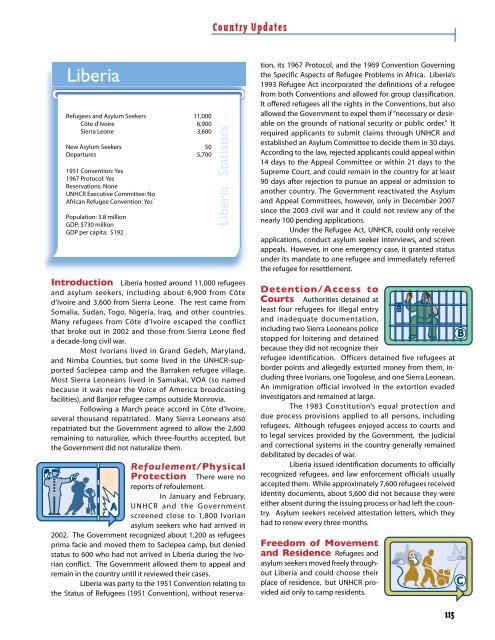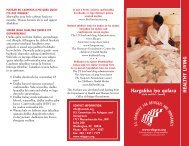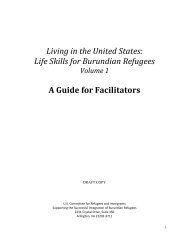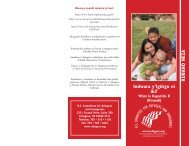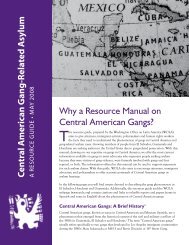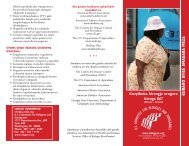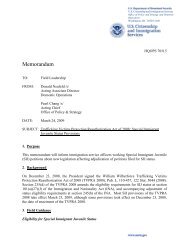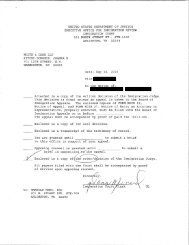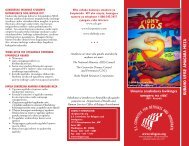Refugees and Asylum Seekers
Refugees and Asylum Seekers
Refugees and Asylum Seekers
Create successful ePaper yourself
Turn your PDF publications into a flip-book with our unique Google optimized e-Paper software.
Liberia<br />
<strong>Refugees</strong> <strong>and</strong> <strong>Asylum</strong> <strong>Seekers</strong> 11,000<br />
Côte d’Ivoire 6,900<br />
Sierra Leone 3,600<br />
New <strong>Asylum</strong> <strong>Seekers</strong> 50<br />
Departures 5,700<br />
1951 Convention: Yes<br />
1967 Protocol: Yes<br />
Reservations: None<br />
UNHCR Executive Committee: No<br />
African Refugee Convention: Yes<br />
Population: 3.8 million<br />
GDP: $730 million<br />
GDP per capita: $192<br />
Introduction Liberia hosted around 11,000 refugees<br />
<strong>and</strong> asylum seekers, including about 6,900 from Côte<br />
d’Ivoire <strong>and</strong> 3,600 from Sierra Leone. The rest came from<br />
Somalia, Sudan, Togo, Nigeria, Iraq, <strong>and</strong> other countries.<br />
Many refugees from Côte d’Ivoire escaped the conflict<br />
that broke out in 2002 <strong>and</strong> those from Sierra Leone fled<br />
a decade-long civil war.<br />
Most Ivorians lived in Gr<strong>and</strong> Gedeh, Maryl<strong>and</strong>,<br />
<strong>and</strong> Nimba Counties, but some lived in the UNHCR-supported<br />
Saclepea camp <strong>and</strong> the Barraken refugee village.<br />
Most Sierra Leoneans lived in Samukai, VOA (so named<br />
because it was near the Voice of America broadcasting<br />
facilities), <strong>and</strong> Banjor refugee camps outside Monrovia.<br />
Following a March peace accord in Côte d’Ivoire,<br />
several thous<strong>and</strong> repatriated. Many Sierra Leoneans also<br />
repatriated but the Government agreed to allow the 2,600<br />
remaining to naturalize, which three-fourths accepted, but<br />
the Government did not naturalize them.<br />
A<br />
Liberia . Statistics .<br />
Refoulement/Physical<br />
Protection There were no<br />
reports of refoulement.<br />
In January <strong>and</strong> February,<br />
UNHCR <strong>and</strong> the G overnment<br />
screened close to 1,800 Ivorian<br />
asylum seekers who had arrived in<br />
2002. The Government recognized about 1,200 as refugees<br />
prima facie <strong>and</strong> moved them to Saclepea camp, but denied<br />
status to 600 who had not arrived in Liberia during the Ivorian<br />
conflict. The Government allowed them to appeal <strong>and</strong><br />
remain in the country until it reviewed their cases.<br />
Liberia was party to the 1951 Convention relating to<br />
the Status of <strong>Refugees</strong> (1951 Convention), without reservation,<br />
its 1967 Protocol, <strong>and</strong> the 1969 Convention Governing<br />
the Specific Aspects of Refugee Problems in Africa. Liberia’s<br />
1993 Refugee Act incorporated the definitions of a refugee<br />
from both Conventions <strong>and</strong> allowed for group classification.<br />
It offered refugees all the rights in the Conventions, but also<br />
allowed the Government to expel them if “necessary or desirable<br />
on the grounds of national security or public order.” It<br />
required applicants to submit claims through UNHCR <strong>and</strong><br />
established an <strong>Asylum</strong> Committee to decide them in 30 days.<br />
According to the law, rejected applicants could appeal within<br />
14 days to the Appeal Committee or within 21 days to the<br />
Supreme Court, <strong>and</strong> could remain in the country for at least<br />
90 days after rejection to pursue an appeal or admission to<br />
another country. The Government reactivated the <strong>Asylum</strong><br />
<strong>and</strong> Appeal Committees, however, only in December 2007<br />
since the 2003 civil war <strong>and</strong> it could not review any of the<br />
nearly 100 pending applications.<br />
Under the Refugee Act, UNHCR, could only receive<br />
applications, conduct asylum seeker interviews, <strong>and</strong> screen<br />
appeals. However, in one emergency case, it granted status<br />
under its m<strong>and</strong>ate to one refugee <strong>and</strong> immediately referred<br />
the refugee for resettlement.<br />
Detention/Access to<br />
Courts Authorities detained at<br />
least four refugees for illegal entry<br />
<strong>and</strong> inadequate documentation,<br />
including two Sierra Leoneans police<br />
stopped for loitering <strong>and</strong> detained<br />
because they did not recognize their<br />
refugee identification. Officers detained five refugees at<br />
border points <strong>and</strong> allegedly extorted money from them, including<br />
three Ivorians, one Togolese, <strong>and</strong> one Sierra Leonean.<br />
An immigration official involved in the extortion evaded<br />
investigators <strong>and</strong> remained at large.<br />
The 1983 Constitution’s equal protection <strong>and</strong><br />
due process provisions applied to all persons, including<br />
refugees. Although refugees enjoyed access to courts <strong>and</strong><br />
to legal services provided by the Government, the judicial<br />
<strong>and</strong> correctional systems in the country generally remained<br />
debilitated by decades of war.<br />
Liberia issued identification documents to officially<br />
recognized refugees, <strong>and</strong> law enforcement officials usually<br />
accepted them. While approximately 7,600 refugees received<br />
identity documents, about 5,600 did not because they were<br />
either absent during the issuing process or had left the country.<br />
<strong>Asylum</strong> seekers received attestation letters, which they<br />
had to renew every three months.<br />
Freedom of Movement<br />
<strong>and</strong> Residence <strong>Refugees</strong> <strong>and</strong><br />
asylum seekers moved freely throughout<br />
Liberia <strong>and</strong> could choose their<br />
place of residence, but UNHCR provided<br />
aid only to camp residents.<br />
B<br />
C<br />
115


